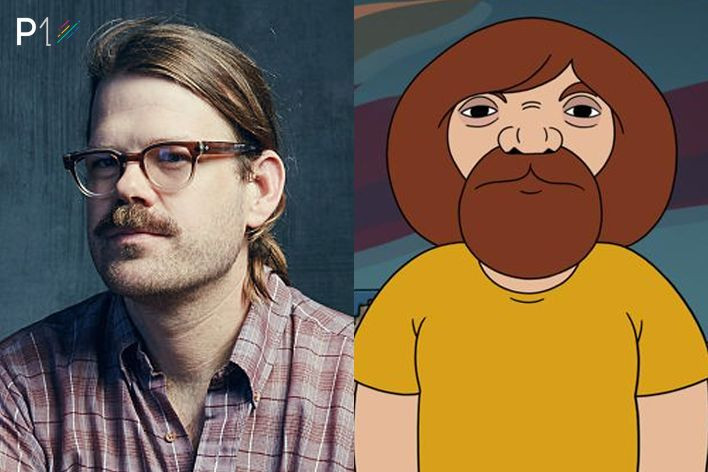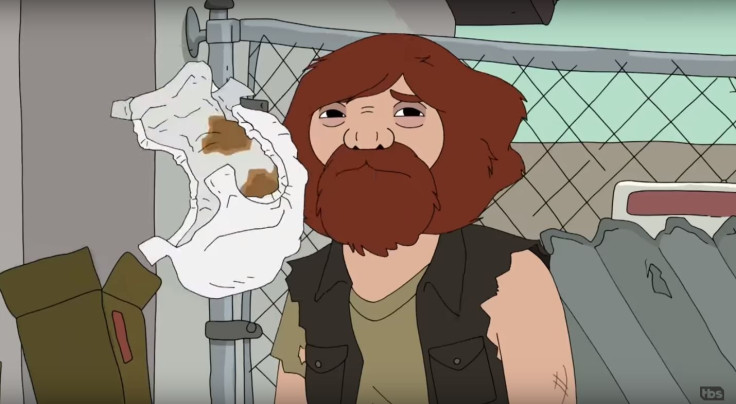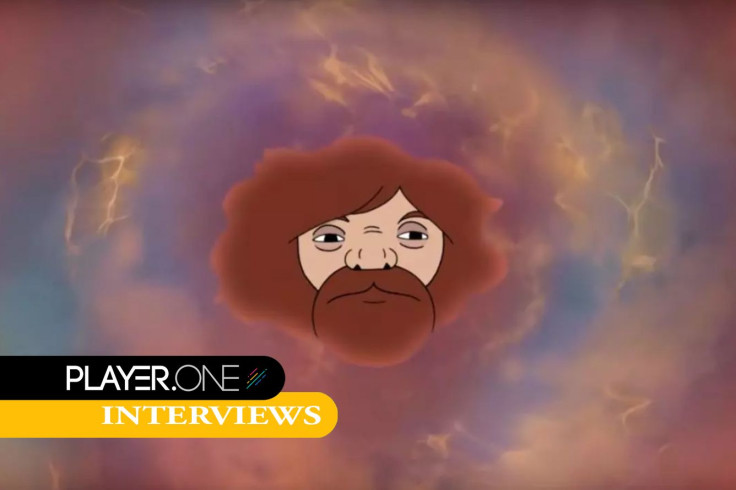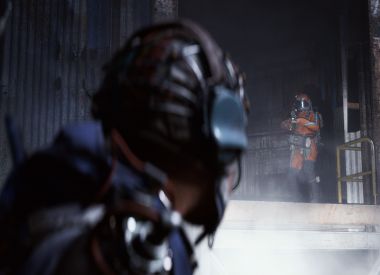Each episode of Tarantula is narrated by Echo Johnson, unlicensed tattoo artist, who's won wisdom through hard living and live-and-let-live decency. Echo embodies Tarantula's (and humanity's) crudest and most holy attributes. He's also — and here's where Tarantula gets really strange — nice to people, as if he likes them.
"I was, and am, so over anti-hero humor, that I wanted to do the opposite," Carson Mell, Tarantula creator and voice of Echo, told Player.One. "A lot of it is just trying to find humor in people who are polite. It's weird, because your characters, if you've done your work, are as complex as people you know, so you can't use simple words to describe them. But I wanted to make a show where people are nice to each other, where if you hurt someone's feelings it's a big deal."
Echo shares his wisdom with the drunk, malcontent, oddball, unsavory and eccentric residents of the Tierra Chula flophouse (nickname: The Tarantula). There's rough-and-tumble Bess and her daughter Penny; the sweet and dumb musician Booty; loudmouth Paja (who's favorite hobby is getting high and going to the maternity ward) and tormented sci-fi writer Lucas Reed.
"The one part of writing that's still frustratingly supernatural to me is characters. You just wait for these people to walk out of the mist of your mind," Mell said. Some of the Tarantula characters have been with Mell for years, populating the Tarantula web series preceding the first TBS season. More than almost any other ensemble on TV, the Tarantula residents feel seasoned and three-dimensional.

Tarantula isn't much like any of its animated comedy peers. It's not just its anti-cynicism; Tarantula is weird and marijuana-friendly enough for Adult Swim but too complex and message-forward to fit its irreverent and non-sequitur house style. It also has scenes like the Shit Men biker gang doing some ritual puking, so it's not exactly a mass audience primetime broadcast (though Bob's Burgers may be its closest analog). Neither as rapid-fire as Family Guy or self-consciously clever as Rick and Morty, Tarantula combines the dumb and the astute in unexpected new ways. Tarantula is something all its own, which could flourish with a Season 2 to enrich the world built over its first ten episodes (all are available to stream through the TBS app).
Tarantula's most recognizable strengths are its well-drawn character ensemble and unique locale, but its most enduring quality is a harder to define outlook, in part a refutation of the omnipresent nihilism of modern life, where so many of our jokes amount to a shrug and surrender before the gauntlet of jobs, stress, politics and the oppressive omnipresence of our pinging devices. Tarantula denies its characters the same easy release of cynicism.
"I feel like gallows humor has become so compromised you almost expect to see it in a Pepsi commercial," Mell said. "Like, 'Oh whoa they killed a character!' Killing Kenny was shocking to me, but that was 20 years ago."
A recent episode of Rick and Morty is set at a resort where violence had no repercussions: get shot in the head, bounce back. So when Rick turns off whatever temporal field reverses all the damage Holy shit, Rick & Morty shot a kid in the head seemed to be the desired reaction. This is the "pitch-black comedy" I show up for! This is PRETTY HEAVY STUFF. But goddamn if it didn't feel a little … forced. The audaciousness felt phony. Or at least, the *gasp* reaction to the joke felt phony. What was once edgy became expected, normal and dull.
Though its setting and characters are unorthodox, some of Tarantula flows from that wellspring of all animated comedies, The Simpsons, itself a once-grand institution decayed into something weird and garish, like the Tierra Chula residence hotel.
"I have a theory on the theme of The Simpsons," Mell told me. "It's funny that it was considered the anti-family values show. Instead, the show is anti-government, anti-bureaucracy and anti-greed, but it's very loyal. And I think the thesis statement for The Simpsons in the 90s is 'Life is hell, except for the love of your friends and family.' Forget your ego. Forget all these lofty goals and focus on loving your friends and family." That could do just fine as a mission statement for Tarantula too.
Should Tarantula return for a second season, Mell anticipates further Simpsons-like touches. One peripheral character Tarantula introduces is Ben Coen, a grindhouse-era film producer with a backlog of movies with titles like The Mommy Murders, Cannibal Car Driver, You Scream I Laugh and the CHUD/Ghoulies-evoking Chubble. "Knock on wood, if we make more episodes, that'll be the Itchy & Scratchy of the show, these super gorey old movies of his. And you have to bear with him every time you talk to him," Mell said.
The jokes Tarantula chases are often low-brow, but with a surprising depth. The first gag Mell thought up for the show is slapstick, scatological, and simple: Echo gets smacked in the face by a dirty diaper. But there's a little more to it. It's visual counterpoint to Echo's version of pretentiousness, as he admits to preferring life at the Tierra Chula to his former vagrancy: "Now I hate to sound like a snob here, but I just hate being homeless." Even the wind that kicked up the diaper emerges organically from the show's environment, blown by SoCal's famous Santa Anas.

There's another, entirely different, undercurrent to Tarantula's street-level, character-centric focus: sci-fi psychedelia. It comes in part from Mell's own experience self-publishing sci-fi (start with Field Notes From Dimension X), but it's also a loose variety of magical realism, where the fantastical and the real-world overlap. In the world of Tarantula there are many portals to higher planes of existence and imagination. Drugs, of course, such as Booty and Echo's long hike to the giant mushroom forest, where dreams are enhanced by napping atop the massive toadstools. But there's also Lucas Reed's short stories and Echo's holistic meditation ("Koyaanisqatsi!" he shouts after detecting an imbalance in nature).
An autopsy of Tarantula 's narrative characteristics ultimately can't capture its living energy. In combining idiosyncratic characters, a distinct setting and its peculiar combination of mundane and supernormal, Tarantula projects a mood that sets it apart from any other show on TV. It's a chill sitch, laidback, working class and smart and rude. Its laughs often hit unexpectedly, like little surprises.
"I hope it's not just fancy folk that like it," Mell said.
Tarantula feels like a world just opening up. So much of the scant TBS marketing for Tarantula is of the "Get To Know X Character" variety. Well, after this first season we've been properly introduced, now let's see what happens next.


















